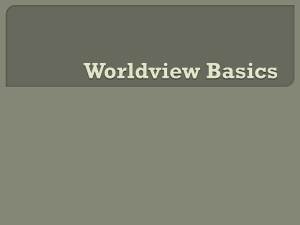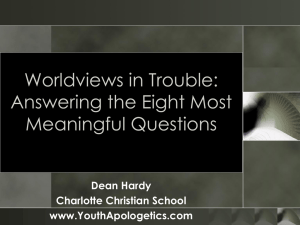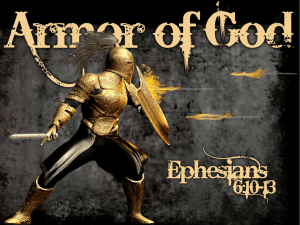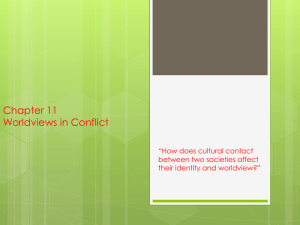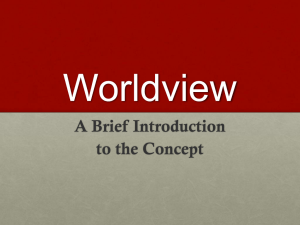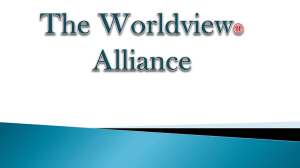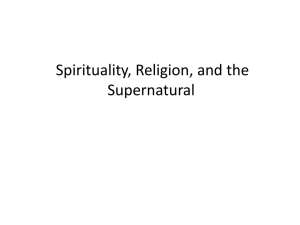File
advertisement
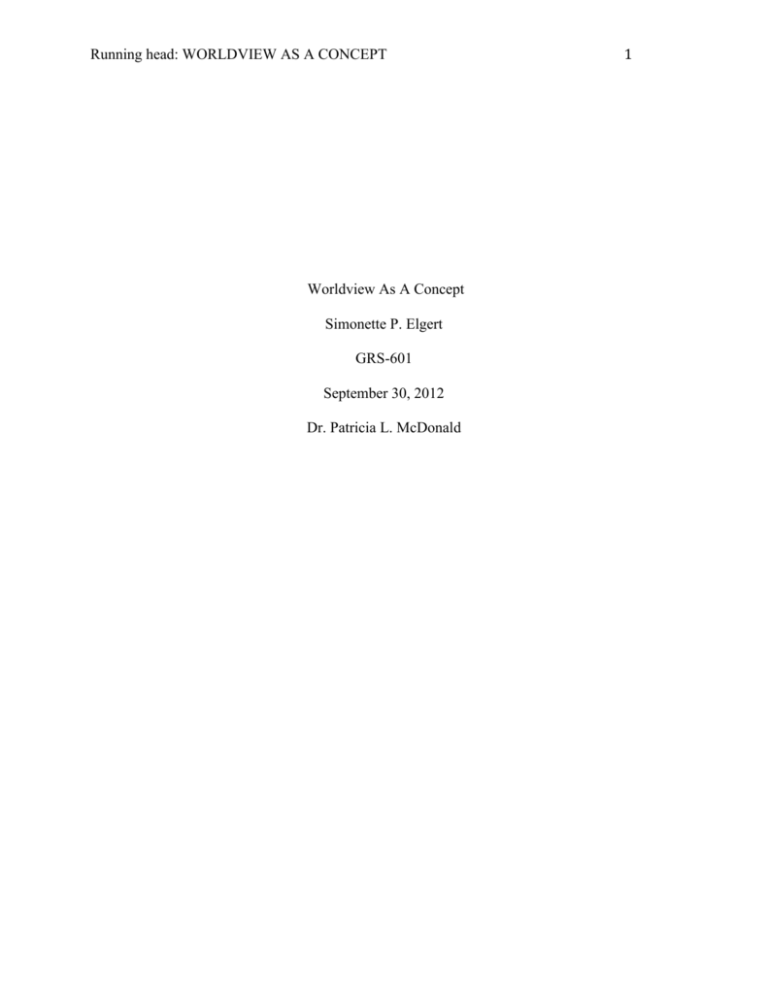
Running head: WORLDVIEW AS A CONCEPT Worldview As A Concept Simonette P. Elgert GRS-601 September 30, 2012 Dr. Patricia L. McDonald 1 WORLDVIEW AS A CONCEPT 2 Worldview As A Concept When I started reading the book Naming the Elephant, I didn’t know what to expect until I read the preface. The author, James W. Sire gave an introduction on why he wrote the book. I learned that in 1976, he wrote the first edition of The Universe Next Door to orient himself on human commitment, the depth of human insight and the consequences of having a “view” of the world (Sire, 2004). In this book, he enumerated and explained seven basic worldviews. In 1997, because of the birth of “postmodernism”, the third edition came about. Several other books and thoughts followed addressing worldview definitions (Sire, 2004). In his introduction Sire expressed his dissatisfaction on the way he conceptualized worldview in his earlier works and recognized the need for rethinking and redefining taking into consideration the fact that “worldview is not just a set of basic concepts but a fundamental orientation of the heart” (Sire, 2004). This is when I realized the term “worldview” is bigger than life. I became anxious and questioned how I would be able to understand such concept where in fact the author himself kept redefining his works for clarity and better understanding. In order to adequately understand the word, I searched for a definition outside of the context of the book. A definition that is basic and simple for my comprehension. I came across a journal article, Reasons to Believe: What in the World is a Worldview? In this article, worldview was defined as “how one sees life and the world at large”. The author also compared the word to a pair of glasses: how a person makes sense of the world depends upon that person’s ‘vision’. With this definition in mind, I delved into reading Naming the Elephant. Chapter one touched on defining worldview as presuppositions one holds about the world. (Sire, 2004, p.19). In my mind, if they are defining the word worldview as an assumption, then there would be millions of views out there. If this is the case, how are we going to come up WORLDVIEW AS A CONCEPT 3 with a unified definition for better comprehension? Reading further, I found out it is possible to have limited outlook if we group the universe by race, culture, religion and beliefs. People of the same culture more often than not form the same beliefs and values, stemming from their life orientation and exposure. Same holds true with religion. I was raised Catholic from birth and through my formative years, and as an adult I am practicing Catholicism. I wasn’t exposed to any other religion but have heard of how they differ from mine, my choice is primarily through assumption that Catholicism is the ultimate religion. The Catholic religion is my orientation, my belief and my values. This doesn’t make other religions wrong, but my belief is that of my own. It is my own view. Our concept of the world today is the result of the influences of the many real events dating back to when God created the universe and the human kind (did he or did he not?). Those events were transformed into recollection and stories handed down from the beginning of time. The accuracy remains to be discovered. Even the bible is in question. But, our support of some of the views came from varying philosophical perspectives brought about by the many contrasting beliefs and knowledge of the early philosophers and theologists. One of my favorite definitions came from a Canadian philosopher, James Olthuis. As cited in Sire (2004), “A worldview (or vision of life) is a framework or set of fundamental beliefs through which we view the world….this vision is a channel for the ultimate beliefs which give direction and meaning to life”. Our own views define our existence and the way we behave and how we face realities. It translates into a broader view in relevance to how the people around us choose to give meaning to our private views. They may interpret those views either right or wrong or they may choose to filter some. This is an indication of how diverse one’s worldview is. And because of this diversity, we are always finding people who have contrasting values, who WORLDVIEW AS A CONCEPT 4 believe otherwise. These differences in perspectives are ultimately the driver of the many interactions and challenges in pursuit of the truth. According to Aristotle, as cited in Sire (2004), “All men by nature desire to know” The truth in any of the worldviews lies in it’s origin, the truth may have been formulated using scientific studies as it’s basis or it could be based from the more complicated theological origin. The truth we believe in plays a big part in how we live our lives, how we interact and how we respond or react. This is because “…there is at least one worldview that can be as intimate for each of us…” (Sire, 2004, p.119) It is up to me to name the elephant. Conflict is another potential by-product of worldview and people’s quest for the truth. The differences in beliefs and outlooks bring about varying degrees of understanding and acceptance of what reality really is. I came across a quote by Margaret Wheatley that said: “Conflict is an inevitable result of interdependence and interconnectedness. The way to get through it is to start from the assumption that we all care about the same thing” We search for what is true because of our desire to know about the things we care about. It is up to me to name the elephant Everyone has worldview. Regardless of race, culture, education and religious orientation. There is no right or wrong. It is all dependent on how one sees life and the world at large. My worldview is my reality, and my reality is my purpose in life. WORLDVIEW AS A CONCEPT 5 References Samples, K. (2007). Reasons to Believe: What in the world is a Worldview, 2007, 1-3. Sire, J.W. (2006). Naming the Elephant: Worldview as a concept. Downers Grove, Illinois: InterVarsity Press
